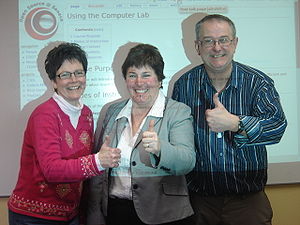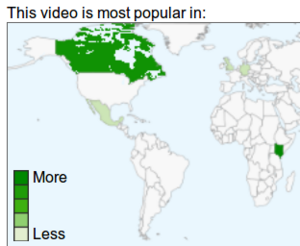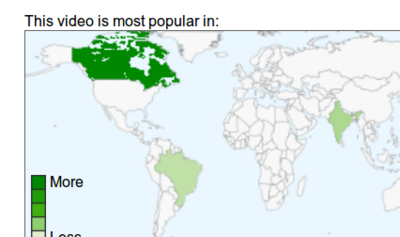Difference between revisions of "Wiki Collaboration at Westminster?"
| Line 21: | Line 21: | ||
===A Little History and Perspective=== | ===A Little History and Perspective=== | ||
| − | :'''The concept of collaborating on-line is <u>not</u> new'''. Even the predecessor to the Internet ('''ARPAnet''') which was developed by the U.S. military in the 60's created a system of networked computers | + | :'''The concept of collaborating on-line is <u>not</u> new'''. Even the predecessor to the Internet ('''ARPAnet''') which was developed by the U.S. military in the 60's created a system of networked computers connected by fast and complex communication networks used to discourage any Soviet "first nuclear strike". Out of this system rose the '''MAD doctrine''' (Mutually Assured Destruction). This, in turn, led to reduction of nuclear arms and non-proliferation treaties. |
:In the 70s and 80s, there was a need for nuclear and rocket scientist to collaborate in order to advance nuclear missile research. All scientists needed a way see the "big picture" as opposed to only their own particular contribution. Since '''these scientists worked in research organizations like universities and colleges, this allowed other participants, such as instructors and students, to also use many of these collaboration tools such as e-mail, and web-browsers accessing the World Wide Web'''. | :In the 70s and 80s, there was a need for nuclear and rocket scientist to collaborate in order to advance nuclear missile research. All scientists needed a way see the "big picture" as opposed to only their own particular contribution. Since '''these scientists worked in research organizations like universities and colleges, this allowed other participants, such as instructors and students, to also use many of these collaboration tools such as e-mail, and web-browsers accessing the World Wide Web'''. | ||
Revision as of 09:27, 1 July 2011
Contents
- 1 Purpose
- 2 The Importance of Collaborating Online
- 2.1 YouTube Video
- 2.2 Written Concepts
- 2.3 A Little History and Perspective
- 2.4 The Wrong "Ties That Bind"
- 2.5 Hidden Opportunity Costs
- 2.6 "Unlock Those Chains": Collaborate Online
- 2.7 Resist the Temptation to be Shy
- 2.8 "Reduce, Reuse, Recycle"
- 2.9 "Water Seeks its Own Level"
- 2.10 Has It Been Successful?
- 3 Additional Resources
Purpose
- The purpose of this "WIKI Article" is to help explain how promoting "online collaboration" through the use of WIKIs may help reduce volunteer workload, and build a customized online database for church volunteering and operational activities. In turn, this on-line databaes can be used for the Westminster congregation,the Orangeville community, and the entire World.
- This article is based on this author's observations and professional experience when using online collaboration tools such as WIKIs.
The Importance of Collaborating Online
YouTube Video
- If you want to see a YouTube video discussing WIKIs, here is a link to a customized YouTube video: http://www.youtube.com/watch?v=-dnL00TdmLY
Written Concepts
- Below are the written concepts (in case you prefer to have a printout of these concepts or suggestions):
A Little History and Perspective
- The concept of collaborating on-line is not new. Even the predecessor to the Internet (ARPAnet) which was developed by the U.S. military in the 60's created a system of networked computers connected by fast and complex communication networks used to discourage any Soviet "first nuclear strike". Out of this system rose the MAD doctrine (Mutually Assured Destruction). This, in turn, led to reduction of nuclear arms and non-proliferation treaties.
- In the 70s and 80s, there was a need for nuclear and rocket scientist to collaborate in order to advance nuclear missile research. All scientists needed a way see the "big picture" as opposed to only their own particular contribution. Since these scientists worked in research organizations like universities and colleges, this allowed other participants, such as instructors and students, to also use many of these collaboration tools such as e-mail, and web-browsers accessing the World Wide Web.
- Ironically, the mechanism that developed from the "fear of war", developed into an infrastructure to help to promote peace and helping to "bring people together".
- That is what would I call an unexpected but highly pleasant side-effect! :)
- Computer programmers, since the 70s, connected via computer networks to collaborate when creating software application, with very quick and efficient results. If the new catch-phrase "Working in the Cloud" applies to storing documents and editing them in "cyberspace", then this author has been "Working in the Cloud" since 1998 (long before this term was invented)...
- This need to "connect" has now extended from educational institutions into our homes and our everyday lives:
- Smart phones, Blackberries, tablets, etc
- Checking e-mail on a daily basis
- Checking weather conditions or checking school cancellations on web-pages
- Expectation (no longer luxury) of wireless connectivity in public places (eg. McDonalds has now gone wireless)
- Feeling of "disconnection from World" if Internet service is down
- This need to connect is further validated by the quick growth of social media applications such as:
- Myspace
- Angie's List
- Craig's List
- Freecycle
- Ebay
- etc...
- This trend will not only continue, but rather accelerate as our increased need for purposeful "connection" grows.
The Wrong "Ties That Bind"
- Although many tools already exist for on-line collaboration, many of them are not properly used, or used at all.
- For Example:
- Nearly everyone uses e-mail
- Although very useful, e-mail is not the best method for on-line collaboration.
- Although very useful, e-mail is not the best method for on-line collaboration.
- Not all Social Media Works the Same Way
- For example, Facebook and Twitter are useful for posting messages and keeping in touch with friends and events,
but they lack the ability to create and collectively edit ideas and document content in a transparent manner.
- For example, Facebook and Twitter are useful for posting messages and keeping in touch with friends and events,
- Two-way Disconnection of Document generation and editing
- Documents involving word-processing, spreadsheets, and slide-shows are mainly edited "off-line", which requires more work downloading and uploading files. Although they may be posted to web-pages, those documents are not really considered "living documents", but rather indicate a "one-way flow" of information...
- Natural Disconnects to Online Collaboration
- I would guess if I asked a random group of people what a WIKI was, eighty-five percent would not know. On the other hand, if I asked how many of them used WikiPedia, eighty-five percent of them would respond "yes". If I asked how many added content to Wikipedia on a topic, less than a tenth of a percent would respond "yes".
- Nearly everyone uses e-mail
- In fact, without consciously knowing it we conditioned to avoid on-line collaboration:
- Fear of Change
- It is a fact that most people are hesitant to accept change (even if it will benefit them in the future).
- Fear of Commitment (especially time)
- Ironically, people may see an "additional workload" incurred in the learning-curve during their very busy-busy lives, but not realizing that it will "pay-off" and will definitely reduce their workload, not only for volunteer activities, but in their personal lives in the not-to-distant future.
- Fear of Participation
- People may find that they don't have much to offer on the wiki, but participation can be as simple as correctly spelling and grammar. I believe in that old saying, the only silly question is the one that is never asked...". Everyone that participates has validity, and promoting community by encouraging participation has everything to do with a church!
- Jotting notes with pen and pencils
- WIKIs did not exist when many of us were educated.
- Negative Reinforcement that collaboration is associated with cheating
- Students today are learning how to collaborate in order to be successful in their future lives. This directive has been adopted into student curriculum since this is the skill that business and our society demands from our future citizens.
- Negative Perceptions Among Instructors
- In this rapid adjustment into the "information age", sometimes the students should be training the instructors, and leave the instructor to focus on teaching timeless concepts such as critical thinking, research techniques and team-building. If properly utilized and monitored, instructors could be "leading the students by example" to prepare them to collaborate in a proactive manner to benefit society, their workplace, and their personal lives.
- Private Interests
- Trying to own a collaborative idea or concept can limit its growth or success. When people mention that I should copyright the "/Guide on the Side/" Computer Lab resource, I immediately respond, "that would immediately destroy what I have created". I adopt the attitude, "what you give usually will come back ten-fold". Instead of limiting that resource only to the Westminster Computer Lab, it should be freely available for the World to benefit. Many private interests are trying to compete to control (what I consider) to be the next big wave which is online storage and document manipulation. Free software proponents such as Richard Stallman see the industry term "cloud computing" as nothing more than a "marketing gimmick" (icloud was recently released from Apple). Many computer program developers have collaborated for decades before the term "cloud computing" became fashionable...
- Fear of Change
Hidden Opportunity Costs
- It would be incorrect to say that WIKIs are necessary for the survival of Westminster United Church. Technical aspects of this church (in terms of computers) only makes up a tiny elements of what the church does. In reality, it is the contribution of the church members and volunteers that keep the church operating.
- On the other hand, computer tools (such as WIKIs to help promote on-line collaboration) can help increase the productivity and communication of its membership. This author is a BIG BELIEVER in "opportunity costs". These hidden costs can "creep-up" that acts as "friction" to slow-down the smooth operation of projects and communication.
- A picture is worth a thousand words: http://www.wikinomics.com/blog/index.php/2008/03/26/wiki-collaboration-leads-to-happiness/
"Unlock Those Chains": Collaborate Online
- Eric S. Raymond, the author of the book "The Cathedral and the Bazaar", compares on-line collaboration for computer software development as a church bazaar, where the setup is not very fancy, but the work and the coordination of its members are key to its success. The same thing could be said about promotion efficient collaboration for any project associated with Westminster United Church.
- "Where can I even begin to learn about WIKIs?"
- "Simple:" There are many computer servers on the Internet that offer free hosting for WIKIs.
- Here is a site to a free WIKI host called WikiSpaces: http://www.wikispaces.com/
- Take advantage of the on-line features of this site to help to learn how to use a WIKI...
Resist the Temptation to be Shy
- Contrary to general opinion, people don't mind having their WIKIs edited - they may even thank you! The author has created many many WIKIs over a two year period. During that time very few people (bordering on "non-existent") have edited those WIKIs. Even if people edit the WIKIs, there is a mechanism that records WIKI history (and user that contributed to editing change), and a mechanism for the WIKI owner to revert to a previous editing session...
- By allowing many individuals the freedom to edit text will accelerate the quality of the article, tutorial, etc...
"Reduce, Reuse, Recycle"
- Once content is stored in WIKIs, it is amazing to discover how many times the content can be reused. For example, the Westminster Computer Lab resource /Guide on the Side/ has many tutorials that are recycled WIKIs that were created months or years ago... This web-page and You-tube videos were created from scratch within a 4 week period. There is no way that this resource could have been created by one person without these on-line tools (such as WIKIs).
"Water Seeks its Own Level"
- This author is not expecting this on-line collaborative resource to be "revolutionary", but as an effective tool to help "lighten the load". Although not all volunteers may not use this on-line tool, it is possible that a few volunteers start to use the tools. When others see the success and time-saving features of on-line collaboration, they may be inclined to start learning how to use the tool...
Has It Been Successful?
|
Additional Resources
- Here are some resources to assist the user using WIKIs:


